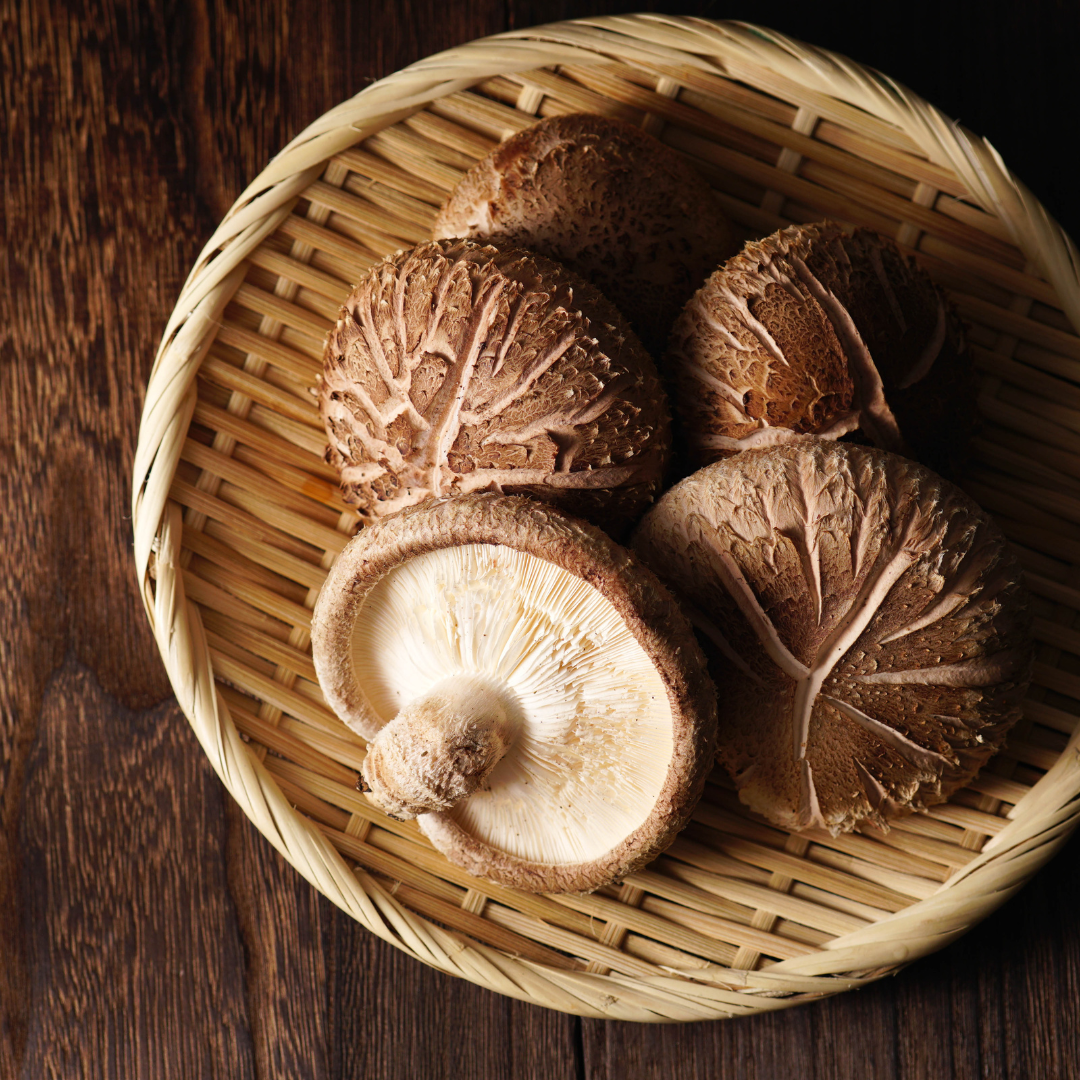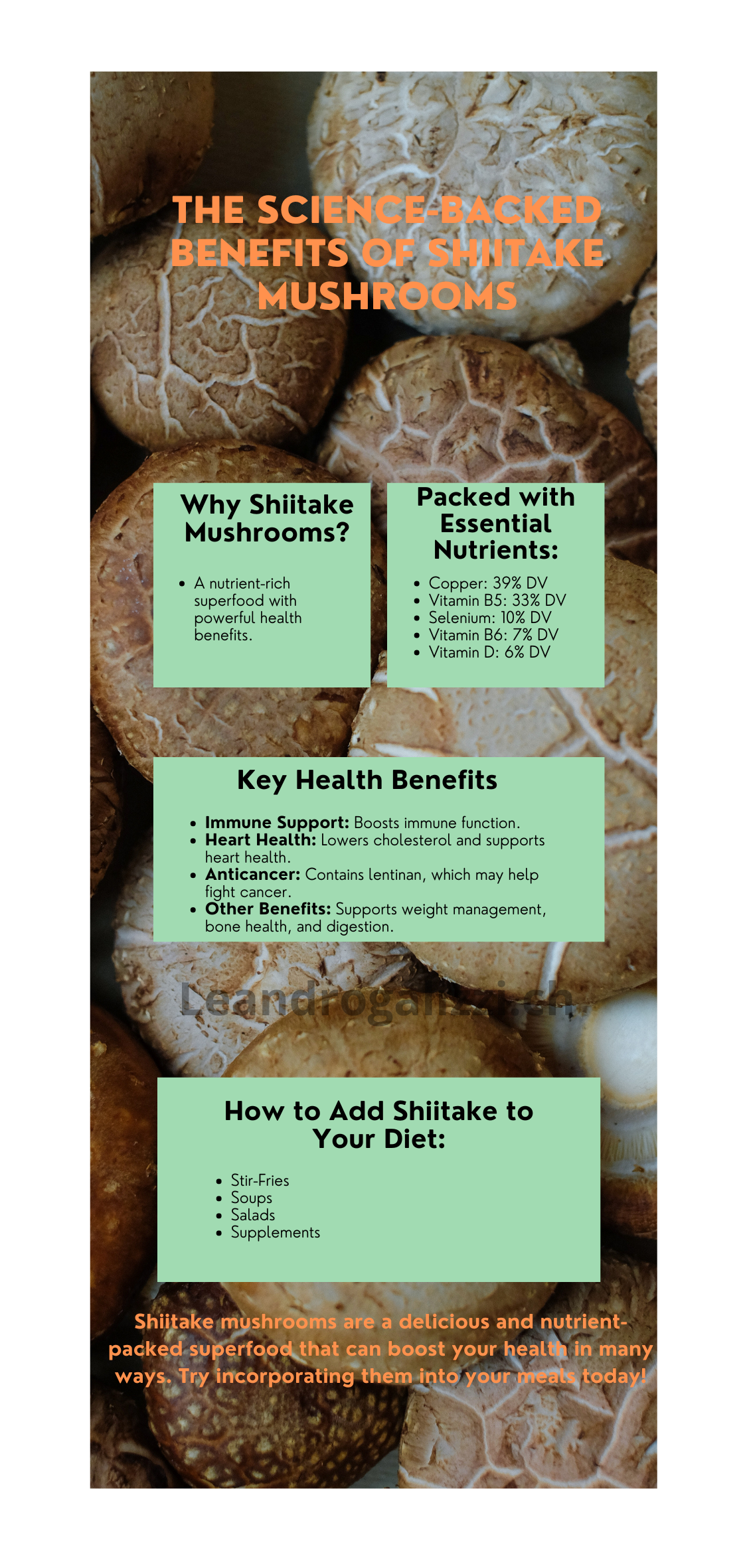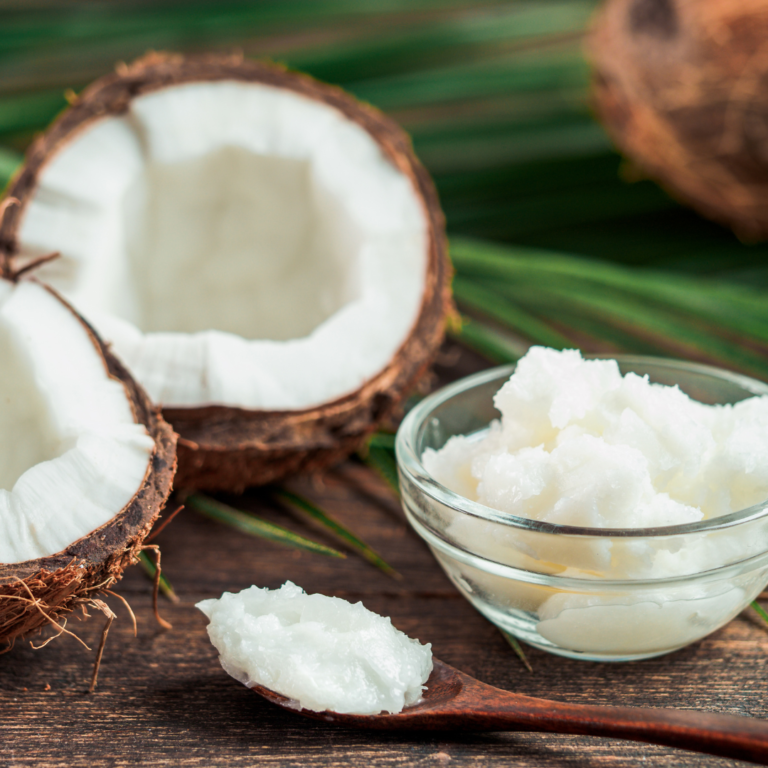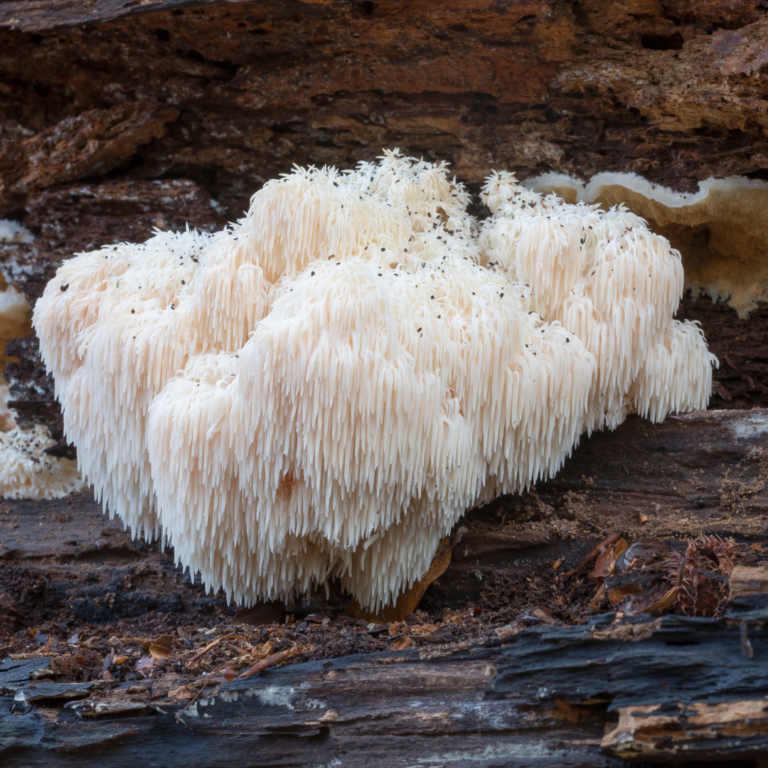Science-Backed Benefits of Shiitake Mushrooms: A Nutrient-Rich Superfood

- Nutritional Profile of Shiitake Mushrooms
- Health Benefits of Shiitake Mushrooms
- How to Incorporate Shiitake Mushrooms Into Your Diet
- Potential Side Effects and Considerations
- Conclusion
Introduction
Shiitake mushrooms have been a culinary staple and medicinal powerhouse in East Asia for centuries. Prized for their rich, savory taste, these mushrooms are more than just a delicious ingredient; they are packed with nutrients and bioactive compounds that provide a host of health benefits. From supporting your immune system to promoting heart health, shiitake mushrooms are a true superfood worth adding to your diet.
In this blog post, we will explore the science-backed benefits of shiitake mushrooms, diving into their nutritional profile and explaining why they are considered a nutrient-rich superfood. Whether you’re looking to boost your health or simply enjoy their unique flavor, shiitake mushrooms offer something for everyone.
Health Benefits of Shiitake Mushrooms
Shiitake mushrooms offer a wide range of health benefits, supported by scientific research. These benefits make shiitake mushrooms a powerful addition to your diet, particularly for those looking to improve their overall health.
Supporting Immune Function
One of the most well-known benefits of shiitake mushrooms is their ability to boost the immune system. Shiitake mushrooms contain polysaccharides, such as lentinan, which play a crucial role in enhancing immune function. Lentinan has been shown to stimulate the production of white blood cells, which are essential for fighting off infections and diseases.
A study conducted on healthy adults found that consuming shiitake mushrooms daily for four weeks improved immune markers and reduced inflammation levels. This suggests that regular consumption of shiitake mushrooms can strengthen your immune system and potentially reduce the risk of chronic diseases.
Heart Health
Shiitake mushrooms are also beneficial for heart health. They contain compounds like eritadenine and beta-glucans that help lower cholesterol levels. Eritadenine works by inhibiting an enzyme involved in the production of cholesterol, while beta-glucans reduce cholesterol absorption in the intestines.
Research conducted on lab rats has shown that a diet rich in shiitake mushrooms can lead to lower cholesterol levels and reduced plaque buildup in the arteries. These effects suggest that incorporating shiitake mushrooms into your diet may help prevent cardiovascular diseases such as heart attacks and strokes.
Anticancer Properties
Shiitake mushrooms have shown promise in cancer prevention and treatment, particularly due to the presence of lentinan. Lentinan is a polysaccharide that has been found to inhibit the growth and spread of cancer cells. It works by activating the immune system to target and destroy cancer cells.
In Japan and China, lentinan is used as an adjunct therapy for cancer patients undergoing chemotherapy. While more research is needed to fully understand the anticancer potential of shiitake mushrooms, current studies are promising and suggest that they could play a role in cancer prevention and treatment.
Other Benefits
In addition to the major health benefits mentioned above, shiitake mushrooms offer several other advantages:
- Weight Management: The fiber content in shiitake mushrooms promotes satiety, helping to control appetite and support weight loss.
- Bone Health: Shiitake mushrooms are a natural source of vitamin D, which is essential for calcium absorption and bone health.
- Digestive Support: The fiber in shiitake mushrooms aids digestion and helps maintain a healthy gut microbiome.
How to Incorporate Shiitake Mushrooms Into Your Diet
Shiitake mushrooms are not only nutritious but also incredibly versatile in the kitchen. Here are some easy and delicious ways to add shiitake mushrooms to your meals:
Culinary Uses
Shiitake mushrooms can be used in a variety of dishes, both fresh and dried. Their umami flavor adds depth to soups, stir-fries, and stews. Here are a few ideas to get you started:
- Stir-Fries: Sauté shiitake mushrooms with your favorite vegetables and protein for a quick and healthy stir-fry.
- Soups: Add shiitake mushrooms to miso soup, chicken noodle soup, or a hearty vegetable soup for an extra burst of flavor and nutrition.
- Salads: Toss sautéed shiitake mushrooms into a warm salad with spinach, quinoa, and a light vinaigrette.
- Pasta Dishes: Use shiitake mushrooms in creamy pasta sauces or as a topping for homemade pizza.
Supplemental Uses
If you’re looking to reap the benefits of shiitake mushrooms but don’t have the time to cook, consider taking shiitake mushroom supplements. These supplements are available in various forms, including capsules, powders, and extracts. When choosing a supplement, look for products that are certified organic and free from additives.
While supplements can be a convenient way to get your daily dose of shiitake mushrooms, it’s always best to consume whole foods whenever possible to maximize nutrient intake.

Potential Side Effects and Considerations
While shiitake mushrooms are generally safe for most people, there are a few potential side effects and considerations to keep in mind, especially if you plan to consume them regularly or in large amounts.
Shiitake Dermatitis
In rare cases, consuming or handling raw shiitake mushrooms can cause a skin condition known as shiitake dermatitis. This condition is triggered by a compound called lentinan, which can cause a rash that appears as red, itchy, and streaky marks on the skin. The rash typically appears within 48 hours of exposure and usually resolves on its own within a couple of weeks. Cooking shiitake mushrooms thoroughly before consumption can help prevent this reaction.
Digestive Issues
Some people may experience digestive discomfort, such as bloating, gas, or diarrhea, after consuming shiitake mushrooms, particularly in large quantities. If you are new to eating shiitake mushrooms, start with a small portion to see how your body reacts.
Allergic Reactions
Although rare, some individuals may be allergic to shiitake mushrooms. Symptoms of an allergic reaction can include itching, swelling, and difficulty breathing. If you experience any of these symptoms after consuming shiitake mushrooms, seek medical attention immediately.
Purine Content
Shiitake mushrooms contain purines, which can break down into uric acid in the body. For people prone to gout, a condition characterized by painful joint inflammation due to high uric acid levels, it may be advisable to limit the intake of high-purine foods, including shiitake mushrooms.
Conclusion
Shiitake mushrooms are more than just a flavorful addition to your meals; they are a nutrient-rich superfood with a wide range of health benefits. From boosting your immune system and supporting heart health to potentially offering anticancer properties, shiitake mushrooms are a versatile and valuable component of a healthy diet.
Whether you choose to enjoy them in soups, stir-fries, or as a dietary supplement, shiitake mushrooms can help you achieve better health and wellness. Just be mindful of the potential side effects and consider starting with small amounts if you’re new to this superfood.
So why not give shiitake mushrooms a try? Their unique flavor and impressive health benefits make them an excellent choice for anyone looking to enhance their diet with nutrient-rich foods.
Have you tried cooking with shiitake mushrooms? Let’s inspire each other to embrace the power of this incredible superfood!
References
1. Lentinan and Immune Function: https://pubmed.ncbi.nlm.nih.gov/25346611/
2. Shiitake Mushrooms and Heart Health: https://www.ncbi.nlm.nih.gov/pubmed/21663327
3. Anticancer Properties of Lentinan: https://www.ncbi.nlm.nih.gov/pubmed/22583406
4. Study on Shiitake and Blood Pressure in Rats: https://www.ncbi.nlm.nih.gov/pubmed/3443885/
5. Nutritional Profile of Shiitake Mushrooms: https://fdc.nal.usda.gov/fdc-app.html#/food-details/168436/nutrients
6. Shiitake Dermatitis and Lentinan: https://www.ncbi.nlm.nih.gov/pubmed/26034783
7. Purine Content and Gout: https://www.ncbi.nlm.nih.gov/pubmed/21669599






